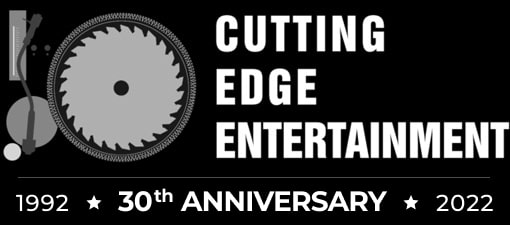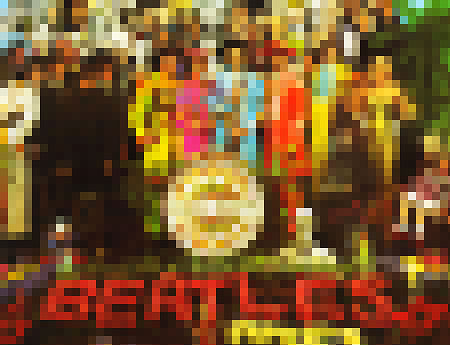Are We Losing Our Music?
You may recognize the image above, but simply because your brain tells you that the colors and shapes are familiar. At second glance one can see that although familiar, it is blurred, distorted and “compressed”. Now what if I were to tell you that unless the music that you listen to is on a CD or vinyl, that the image represents the visual equivalent of the loss of sound wave, or frequency in the music most of us are listening to?
The MP3 format has become the new standard, for both the mobile DJ and the casual music listener. It’s not unusual for a DJ to carry from 500 gigabytes to a terabyte worth of music with them these days in an MP3 format, replacing the cumbersome and laborious CD collection. In an article published by About.com titled Vinyl vs. CD (a very good read I might add) the author says this;
“It is a strange music world we live in. There has been and is a major upheaval in the way consumers discover, purchase and listen to music. People listening to music on their cell phones and fitting their music collections in their pockets with portable iPods and MP3 players. Digitization, it seems, is the new distribution process for most with file sharing, ring tones, YouTube, iTunes, MySpace, Satellite radio and downloading is the only option for some.”
Although true about digitization being the the new medium for distribution, and ultimate convenience finally being within our grasp (both DJ and consumer), is the sacrifice really worth it? This brings me to the next article I read regarding the subject (another very interesting read), by John Atkinson, Editor of stereophile magazine titled MP3 vs AAC vs FLAC vs CD which makes this statement:
“The MP3 codec (for COder/DECoder) was developed at the end of the 1980s and adopted as a standard in 1991. As typically used, it reduces the file size for an audio song by a factor of 10; eg, a song that takes up 30MB on a CD takes up only 3MB as an MP3 file. Not only does the 4GB iPod now hold well over 1000 songs, each song takes less than 10 seconds to download on a typical home’s high-speed Internet connection.”
But apparently this is not the first technological “upgrade” that has resulted in us being robbed of some sound quality. According to Gary Freiberg from Vinyl Record Day – a non-profit dedicated to the preservation of vinyl records – the analog recording (vinyl record) has a wider frequency range than the digital compact disc, and in speaking with him, he agreed it would be fair to say that the compact disc is merely a compression of analog. It would seem therefore that the loss started back in the 80s when the CD supplanted the vinyl LP record album.
It all seems pretty dismal, but there is still hope. My first suggestion would be to stop downloading all of that music from iTunes and Amazon, and to start buying CDs again. Unless of course you are downloading “lossless” digital file formats (WAV files for example are truly CD quality, but take up a great deal more space). This would take the capacity of your 8GB iPod from 2,000 songs down to about 260 songs (or 26 albums), and I highly doubt anyone will make that sacrifice, so for now we’ll all keep using MP3s.
But technology will improve, storage space will increase, file sizes will shrink and it will all become more easily affordable in the next few years (it always does). If you own the CD, you can rip the songs in any format you like. No matter what you may read or hear, the MP3 is not CD quality, but you can at least choose to rip a CD at a higher bit rate than most online downloads offer. This in itself is a significant improvement in sound. Eventually, when the storage space in an iPod jumps to the multiple terabyte range, you could conceivably delete MP3s and re-rip your music to a non-compressed file, and re-achieve CD quality. Or of course you can keep buying inferior MP3s, and perhaps repurchase the larger files when the technology finally catches up with the convenience that is causing us to lose the fullest possible sound in our music.
For now, I’ll keep my CDs. I maintain control over the bit rate at which my MP3s are created, and when the MP3 goes the way of the dodo bird, I’ll still own the CD master files which I’ll be able to use to create the improved and lossless digital files. As a DJ, this will allow me to improve my sound quality, without spending the money time and time again… I own the masters. For those hardcore vinyl and CD enthusiasts, more power to you! Keep up the good fight!
On the other hand, there are those who say the loss doesn’t take away from their listening pleasure, and for the most part I would tend to agree. Perhaps on a bazillion dollar home theater surround system with flux capacitors and warp drives the loss is clear as a bell, but with most music listening these days happening with little headphones, it seems we can still enjoy our tunes without missing a beat :).
-Craig
Image reproduced with the permission of Source Interlink Media


Craig,
Nicely stated, but I would have some suggestions.
First, you deftly dodged the debate between vinyl and CD, but there is pretty good evidence that records have better dynamic range in certain frequency spectra; furthermore, records pro…bably do a nice job of compression in others. Overall, this leads to a very nice sound with no ear fatigue. However, unless one has hundreds to thousands of dollars to shell out for a good phono/cartridge system, records are a luxury.
So, it is clear that the medium of choice for all of us should be the CD. The high-end audio formats on disc (like DVD audio) have failed, and they seem to be focused on gimmicks rather than content. So, we are left with CDs, with their easily cracked jewel boxes and tiny liner notes. Of course, this is still better than what is included with MP3/AAC/WMA downloads.
You are definitely right that lossy encoding like MP3 removes vital information. It’s just an algorithm, albeit one which is not terrible. On the other hand, the one great thing about MP3 encoding is that it makes music highly portable. It’s fun to make playlists prior to going on vacation and then loading them onto an iPod. Beach Boys for Florida; Sinatra for Vegas; Ventures for California.
Thus, my solution is similar to yours. I encode in two formats. I have copies of everything on my hard drive in MP3 (256 kps is a good compromise). For the stuff I love, I encode in FLAC lossless and keep on my home server. I can then listen to my CDs without having to pull them out of the box.
I’m wondering – as a DJ, do you use a large-capacity server?
Hey Jon,
i don’t think I avoided the vinyl/CD debate, just felt the point was moot, and I thought it more prudent to stick to the MP3 argument.
I’m not sure what you mean by “large capacity server”, but if by that you mean external storage/hard drive then yes.
Unfortunately, a side effect of digital era (be it music or pictures), is that more people are satisfied with good enough. Many (especially younger people) never experienced anything different than MP3’s, so they don’t know what they are missing.
I would have to agree Mr. V
Great article, Craig! I love the extra research you’ve done to solidify the point that although you can maximize your capacity to store music, you’re sacrificing your ability to maximize your quality.
I think you’ll agree that the trend goes deeper than simple bit-rate encryptions or compression aoftware, but to the music itself. I believe there was a time when “artists” were able to release their music to a captive audience, then their fans would purchase the album (Vinyl or CD) so they could take advantage of the audio clairty, as well as have a keepsake from their favorite band/group/musician. The problem today isn’t just about digital formats or the lack of high-quality recordings, its the oversaturation of the musical market.
Too many musicians, too many songs, too many ways to place them in your pocket. Record publishers are too concerned about finding the “easiest” way to give you their music, rather than finding the “best” way to bring you their music.
And yes…a high-capacity server is a great option. Maybe not for some mobile aspects, but for an office/home setting its perfect. Have a single location for the complete collection and allow access to anyone on that network. I mentioned my media server to you the other day, it’ll carry the MASTER copy of my music collection as well as digital copies of my DVD collection. One stop shop for all my nerdy needs!
Once again, great topic! Always a hot issue of discussion.
Craig
in 1998 there was a test done for the UWA (Uni of WA)
that they wanted to know what difference there was in media formats and
what the sound was like in a home and in a loud club situation
the media used was:
reel to reel
8 track
Cassette
Vinyl Records
CD’s
DVD Music
Mp3’s (in 1998 it wasnt as good as today but can still sounded good)
now in the home – you can tell the difference between whats there as you heard a lot of difference
ok now here is the Club
it was played 15mins on each format
at the end of each format play (while talking was happening, people dancing etc as a normal night out
(even if it was a daytime excersise in a club, they operated it as a fully ran club for the day …)
the results that came out people could NOT tell what format was being used
the only one that you could tell was Vinyl (a scratch in a record)
so if you guys think one is better than the other – TRY it yourself
I bet you will come up with different endings and people wouldnt have a clue what format you are using
you use what ever format is out there – if it sounds good to the client then they will dance
they wont be concerned on “oh its not mp3 @ 320kbps then I am leaving”
have a nice day
Dennis
Very valid point Dennis. My DJ side would absolutely tend to agree, but the facts are still quite intriguing.
Cheers
Well Craig
Thats where all that above should be done again, so that the younger Generation can hear as it really was out there….
They just have no idea on what real sound is now days
this way its proved again 100%
than what it was in 1998
Dennis